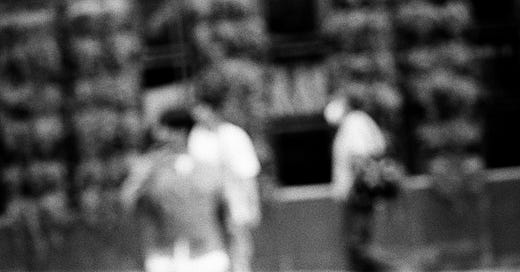UNREAL CITY — Bangkok, a metropolis once replete with immediacy and sudden flows of urban congruence, has now yielded to absolute symbolization; no longer does the inertia of daybreak serve as the final ballast against which our elementary sense of collective identity is held in place, and never again will the skyline come into full view. Yeats once prophesied: “Things fall apart; the centre cannot hold.” And it certainly looks like Bangkok has already become submerged, and thus, ultimately unreal. What is left is merely a faint malodor of hereditary shame, a spell of vertigo now and again, a projection of a city breaking down.
NOTHING BUT A… — Life feels like a dream because it has become so mediated, so out of touch with physical reality. The people here are like cardboard cutouts. The spectacle has dematerialized the concrete aspects of social life and turned them into moving images, interactive symbols, and visual excesses deemed sacrosanct by its captivated audience. Immobilized and enchanted, the subject is inveigled into reproducing himself as immaterially as possible, i.e., on the Internet. Enter Debord: “The spectacle grasped in its totality is both the result and the project of the existing mode of production [...] It is the heart of the unrealism of the real society.”
DEATH — In an unconscious but systematic manner the citizenry at large desires its own mass drowning from which it derives some kind of perverted, thanatotic pleasure, primarily through (virtual) consumption of standardized cultural products. Shopping-towards-death, it must be said, is not in direct contradiction to the DeLilloian variant of consumeristic death anxiety, for those two aspects of mall ritualism simply reinforce one another, giving the illusion that one can attain immortality by simply queuing up at the assisted checkouts. “I've got death inside me. It's just a question of whether or not I can outlive it.” Siam Paragon, centralwOrld, the Platinum Fashion Mall, Emporium, and the like, are among the principal matrices of our streamlined culture, that is to say, the geographically strategic nodes of the institutionalization of all commercial media. Shopping is the primary mode of being. For most Bangkok natives, it defines and thus justifies their existence; it is their raison d'etre.
COST OF JEST — Nothing is taken seriously anymore — not even our own imminent apocalypse. It is easier to perpetually be in the funk than to remain optimistic amidst the unforgiving tempest of postmodernity. In bleak times such as ours, irony at once becomes a defense mechanism and an instrument with which we use to eradicate all things genuine and true. We do not mean what we say, and when we do mean it, nobody believes us. In the end, it is very satisfying to be proven right, which is why so many people have chosen to become cynical about everything: the welfare state, animal rights, Palestine, climate change, or the possibility of a better world in general. The cold, complacent gaze of the cynic is longingly cast into a reified past in which nothing ever came to fruition. The cynic has no idea how the world has come to be, but all he can recognize is the same old tale of societal collapse and moral decay supposedly enacted in real time. Although the cynic is partly right in his somewhat uninformed diagnosis of this vague malady, it seems that he has missed one major symptom. The cynic thinks he has been keeping his distance, all this time, but in actuality, he is more than just a fly on the wall. By doing absolutely nothing, he contributes to what he fears the most: original sin. This is not merely a lapse in human judgment but a classic cop-out.
HUMAN POSSIBILITY — Of course, the cynic would retort by preaching against performative activism or about the futility of change at the individual level, but he does not even begin to think to organize or come up with other alternatives, for he condemns radical hope in the name of smugness from the outset. It is wishful thinking to hope for change when all one does is nothing.
OH SKYTRAIN, PLEASE DERAIL — “Shhh…the adverts are talking! Moving images that try to tell us something, sell us something, and propel us into becoming something.” Posters advertising the new Internet packages; a wagonful of white-collar workers with pit stains standing too close to one another like tinned anchovies with fading aspirations, borderline suicidal; a slightly creeped-out middle-aged woman who seems rather dense, lacking spatial awareness and a functioning sense of object permanence and the this-and-that; social influencers with unnatural albino skin, violently spasming, en masse, in this pale fluorescent light—and the adverts are still talking. The problem with public transportation is that nobody tries to like a social animal anymore. Individualism runs high in this claustrophobically small carriage. Nobody wants to stand or sit near the other person because nobody wants to be seen as a creep. Always, always leave in-between seats for ghosts. Even before the plague this was a standard procedure. Distancing themselves from socialization and unexpected encounters, they are perennially lonely, simultaneously shut in and locked out — a collective they are not.
STRANGERS IN THE NIGHT — A thousand faces momentarily appeared on the liquid-crystal display, none of which felt familiar to me.
DIGITAL THEURGY — Some thoughts are not worth Twittering about. Some thoughts are best kept private. Some thoughts are to be jotted down, and some thoughts are to be left wandering. And some thoughts are to be discarded, even though they are, in the precise sense of the term, memories. Some thoughts are up for grabs, and some thoughts are up to the Divine.




